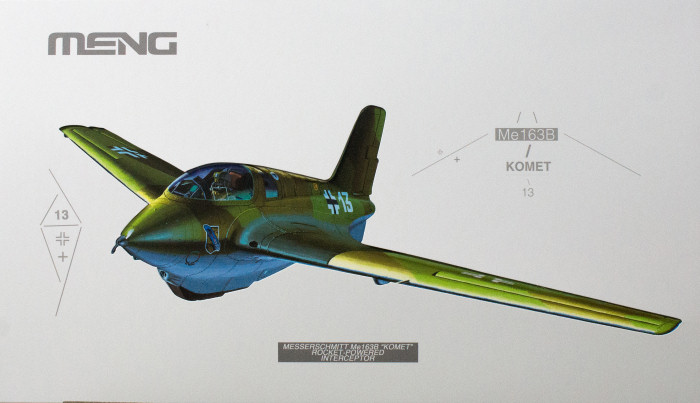
Meng 1/32 Me 163B Komet Kit First Look
By Michael Benolkin
| Date of Review | September 2014 | Manufacturer | Meng |
|---|---|---|---|
| Subject | Me 163B Komet | Scale | 1/32 |
| Kit Number | QS001 | Primary Media | Styrene |
| Pros | Best kit of this subject in any scale | Cons | Nothing noted |
| Skill Level | Basic | MSRP (USD) | $79.99 |
First Look
 |
 |
 |
The Me 163 was aptly named Komet for its ability to streak through bomber formations. Designed by Alexander Lippisch, the Me 163 was the only rocket-powered to ever become an operational combat aircraft - ever. Powered by a single HWK-109 engine, the Me 163 would take-off with a wheeled dolly which would be jettisoned after getting airborne, climb above the bomber formations, then translate any remaining power to speed before the fuel was expended. The aircraft was armed with a pair of 30mm MK108 cannons which it would use against the bombers until it ran out of ammo or energy (airspeed). The Me 163 would dive for home as a glider and land on the grass using its belly skid. In the concept of air defense, the Me 163 was the poster child for point air defense since it couldn't afford to wander far from home.
While the Komet was terrifying to see zipping through bomber formations, it wasn't operationally effective. Any malfunctions with the fuel system would usually melt the pilot. While the aircraft was faster than anything else in the air at the time, it was extremely vulnerable to fighters that would simply wait near its homebase for one to glide home. The MK108 cannons were intended for relatively close engagement which was nearly impossible for an aircraft flying as fast as the Me 163. If Germany had time to gain experience with the Me 163 and arm it with a suitable weapon, the results would have been devastating.
Meng Models has been producing a growing line of kit subjects that are demonstrating how this company has improved its kit design and production processes. Last year, the company tacked a subject that dominated in 1/32 scale by Hasegawa and overall by the 1/48 scale DML (Trimaster) kit. This kit is molded in light gray styrene and presented on four parts trees plus one small tree of clear parts.
Among the features and options in this kit:
- Nicely detailed cockpit
- Positionable canopy
- Detailed HWK-109 engine
- Tail section can be positioned removed to reveal engine
- T-Stoff fuel cell with positionable fuselage access hatch
- Detailed take-off trolley
- Positionable fuselage hatch for ammo storage trays
- Choice of MK108 or MG151/20 guns
- Wing root gun bays with positionable access covers
- Leading edge slats positioned open
- Ventral speed brakes can be positioned open or closed
- Choice of four styles of tailwheel units
- Positionable rudder
- Positionable elevons
- Positionable horizontal trim flaps
The kit decals look nice and provide markings for the following subjects:
- Me 163B, White 13, 2./JG 200, Brandis, 1945
- Me 163B V-41, PK+DL, 1944
- Me 163B, VF241, RAF evaluation aircraft, 1945
The decal sheet also provides a nice set of airframe stenciling as well.
This is a nice looking kit from Meng that beats DML (Trimaster) in detail and easily puts the venerable Hasegawa kit into the rear ranks. It will be interesting to see what subjects and what legacy kits are addressed in the future!







